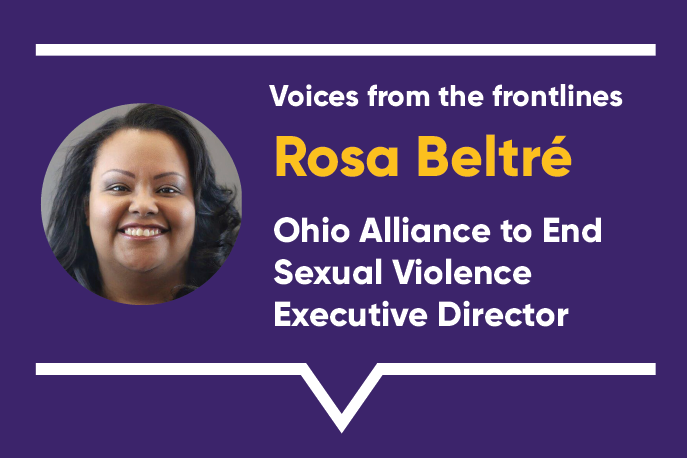“Survivors are the most resilient human beings we know…I am committed to helping them embrace and empower their own voices.”
– Rosa Beltré, Executive Director, Ohio Alliance to End Sexual Violence
In continuing our Voices from the Frontlines series, we talked to Rosa Beltré, Executive Director of the Ohio Alliance to End Sexual Violence (OAESV) about how Ohio’s statewide sexual assault coalition is supporting the unique challenges facing survivors in the pandemic era. This interview has been edited for clarity and length.
Are there groups of people that you’re most concerned about?
In Ohio, I’m especially concerned about the African American and Latinx populations as well as the undocumented population. For many of these communities, it can be much harder to access resources, particularly if they are only available digitally or in English as some may have limited access to internet and/or be non-English speakers. It isn’t fair and it isn’t equitable.
How have you seen the coronavirus pandemic impact survivors?
We’ve seen survivors, especially those in rural and underserved areas, impacted by the pandemic. For example, we have communities who don’t have internet connections or hot spots. Although telehealth and tele-counseling services are great, they are not a fix-all or accessible to everyone.
In moments like this, it’s difficult for survivors to focus on healing. They’re thinking about if they have food on the table, if their loved ones are going to be okay, and about when we are getting out of this. Survivors don’t feel safe and are struggling to meet their basic needs. The support they are seeking goes beyond their victimization and across all areas of their life right now.
Ohio Alliance to End Sexual Violence is holding self-care webinars that are open to the public. What prompted you to take this step?
In times of difficulty and uncertainty, coping with these challenges in healthy ways is a critical skill for survivors, their loved ones, advocates, and the many of us who are on the frontlines of responding to this crisis.
What I want is for others to feel whole and okay especially in these challenging times. Self-care doesn’t look the same for all of us, especially for communities of color.
Our webinars allow people to share what they do to cope, and maybe that could also work for someone else. We all have different coping mechanisms, so the conversations in these webinars have been about ways to take care of yourself and the fact that none of us have the answer to any of this. None of us have a book about what will work best for any of us. We’ve also incorporated virtual movie nights, happy hour, and early tea and coffee which provides space for people to laugh, cry, vent, and ask questions. It’s important to hear from advocates and survivors to better understand what they need and how we can help meet those needs.
Your organization recently held its annual advocacy day virtually. What was that experience like?
We’ve been doing Advocacy Day for eight years, and this year was not going to be the exception. We had over 135 rape crisis center advocates and community partners participate. Many of them also had the opportunity to meet one-on-one with their individual representative virtually. It went well!
We are still planning to have an in-person advocacy day on the 20th of September because we think it’s important to have people coming together in the community to continue advocating for funding for survivors.
How does your work with survivors continue to inspire you even during difficult times?
Survivors are the most resilient human beings that we know. Amidst abuse, survivors are still standing. That pushes me every day to say we have to advocate for them. We have to be able to do better for them and better to them. I am committed to helping them embrace and empower their own voices.
How can people support survivors and organizations who are serving their communities during this time?
In times of great needs, there are also many ways people can help.
– Donating money: Right now, coalitions, local rape crisis centers, and many agencies are unable to hold fundraisers, so people can help support their critical work by donating.
– Mobile access: If people have extra cell phones in their houses, many local organizations are looking to provide donated cell phones and minutes to survivors facing economic hardships.
– Cleaning supplies and masks: In our state, local organizations are seeking supplies we can give to survivors and rape crisis centers as they think about opening their doors again.
Stay tuned for more interviews from the frontlines!

